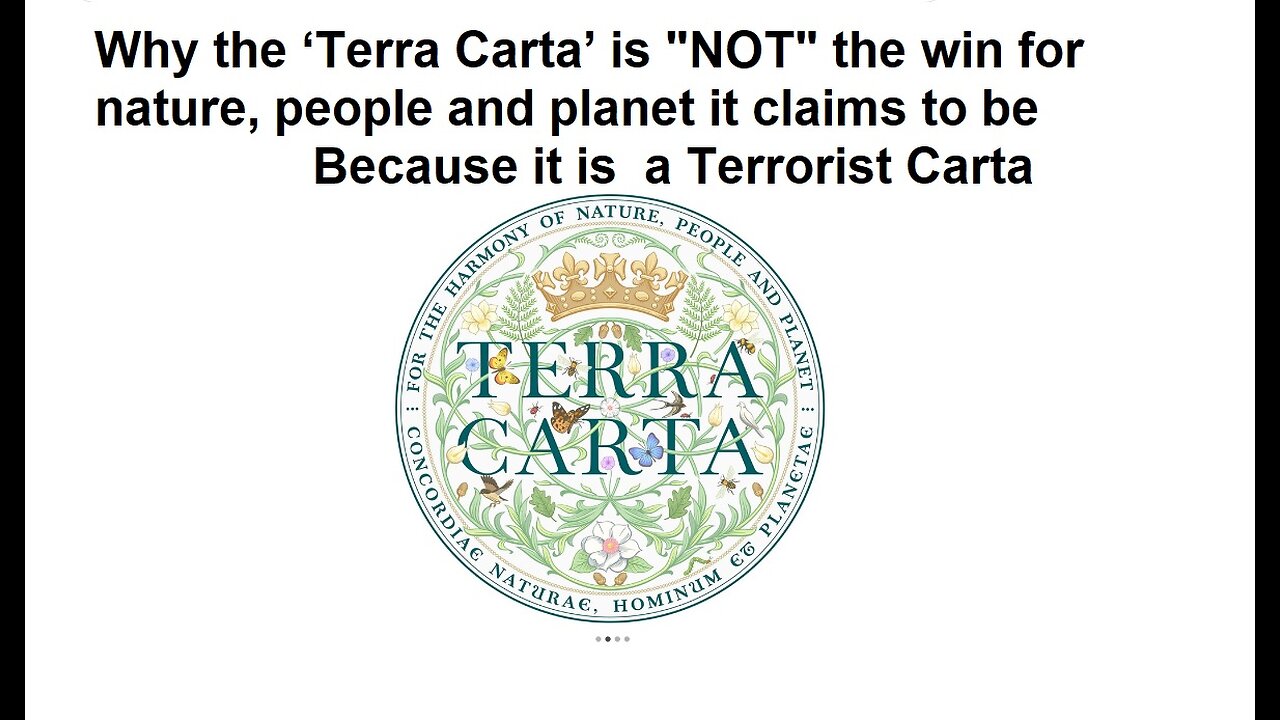Premium Only Content

Why the ‘Terra Carta’ is "NOT" the win for nature, people and planet it claims to be
Zoom 5-10 EST daily https://us02web.zoom.us/j/6945489985?pwd=UllwRmwzRUhWS2pXUWNQODNEbnhSZz09 SwT80SwT80C it is a zero
Why the ‘Terra Carta’ is "NOT" the win for nature, people and planet it claims to be
Terrorist Carta
Behind the positive messages from large-scale environmental initiatives can lie some devastating consequences for politically and economically marginalised people.
We have seen another year of mounting evidence that, as the UN secretary general said in a recent speech, ‘the state of the planet is broken’. However, from recent headlines it might seem that we are starting the new year with huge ‘win-win-wins’ for nature, people and the global economy. On 11 January, France, the World Bank and the United Nations co-hosted the One Planet Summit to accelerate action on the Paris Agreement.
The official focus of this year’s summit was biodiversity, but the real star is the ‘Terra Carta’ (‘Earth Charter’), a new and ambitious sustainable finance initiative launched by the Prince of Wales. The Terra Carta is a 10-point recovery plan that puts industry and finance in the lead of efforts to make ‘a sustainable future the growth story of our time’ and ‘bring prosperity into harmony with nature, people and planet over the coming decade’.
A ‘world-as-market’ paradigm
Big commitments like the Terra Carta and the Sustainable Markets Initiative (SMI) that produced it follow a ‘market environmentalist’ approach to understanding and addressing environmental problems. This approach is rooted in environmental economics and reflects an extreme, reductive and economistic worldview, which researcher Kathleen McAfee calls a ‘world-as-market’ paradigm. Things like ‘nature’, ‘sustainability’ and even ‘crisis’ are defined and assessed in ways that would seem foreign or even perverse to most people concerned with the state of the environment. Rather than conceptualizing nature as most people do – in aesthetic, eco-centric or cultural values, market environmentalist ideology considers ‘nature’ as a stock of capital, with ecosystems as providers of ‘services’ that can be measured in and managed as a balance of quantified ‘impacts’. In this framework, environmental problems are driven by ‘market failures’ and only indirectly by pollution, harmful emissions, or clear-cutting forests.
As the SMI website attests: ‘Choosing Sustainability does not require us to sacrifice profit but asks us to broaden our assessment of capital and its value while exploring how to optimise for global future benefit’.
‘Neutrality’ is a shell game
The shininess and authority of this sort of messaging can hide flawed and dangerous underlying assumptions. They create blind spots and obscure hazards that can drive or intensify real-world environmental harm, exacerbate inequalities, exclude less powerful people from debates, and have devastating consequences for the welfare and livelihoods of politically and economically marginalised people. After all, big financing platforms don’t just operate in the ‘virtual reality’ of banking, market models and databases; they siphon funding to diverse organizations, production chains and resource investment schemes that connect to and impact real-world people, social institutions, politics and landscapes across vast geographic and social distance.
Take the case
Take the case of large-scale renewable or ‘clean’ energy alternatives, such as burning compressed wood pellets (biomass) instead of coal in UK and European power stations, which is often treated like a silver bullet for achieving low-carbon transitions. Biomass now makes up almost 60 per cent of the EU’s renewable energy supply. But where does all that wood come from?
In recent years, the growth of the European biomass industry has actually driven large-scale forest loss in places like Estonia and Latvia because of laws that allow clearcutting even within protected mature forests and national parks. Estonia has lost 15,000 ha of protected forests to pellet manufacture, and Latvian forests now release more carbon than they store. UK and EU dependency on extraction of biomass from Baltic forests is not only destroying mature, living forests that sequester carbon and rare and protected habitats for biodiversity, but also peripheralizes these countries and undermines their own chances of meeting commitments to international climate targets.
Industrial scale wind, solar and nuclear energy all generate ‘green sacrifice zones’ – places and peoples harmed by the sourcing, transportation, installation, operation and disposal of waste products of ‘solutions’ for powering low-carbon transitions, green new deals and sustainable investment platforms. Baotou, in Inner Mongolia, is described as a ‘hell on Earth’ due to the fall out from the rare earth minerals required to make wind turbines, solar photovoltaics and electric cars that are mined and refined there. The global supply chain for sheet mica, used in high voltage cables used to transport wind and solar power, also profits from the exploitation of whole families of miners in southern Madagascar, including children as young as four.
Fortress nature
Influenced by E. O. Wilson’s controversial proposal to set aside half of the Earth ‘for nature’, and pushed by a two-year billion-dollar campaign led by the Wyss Foundation, National Geographic and The Nature Conservancy, the most ambitious of the proposed methods for achieving the Terra Carta’s aims is ‘the protection and restoration of a minimum of 30% of biodiversity, on land and below water, by 2030 and 50% by 2050’. A coalition of more than 50 countries, including the UK, had already signed on to the 2030 pledge, signifying the intent to convert at least 30 per cent of territory to protected areas in which all agriculture, herding and fishing will be prohibited. This is big politics, as the 30 by 30 / 50 by 50 commitment is a likely main target of the so-called ‘Paris agreement for nature’ set to be negotiated at COP15 of the UN Convention on Biological Diversity in Kunming in May and will replace the expiring Aichi targets set in 2010.
The international conservation industry has a long history of failing to recognize or act on the problems it can cause, particularly in the area of ‘green grabbing’. This is the expropriation of land or marine territory ( ‘blue grabbing’ in the latter case) from existing land users (often rural farmers, foragers, artisans, fisherfolk and other residents) by powerful actors and entities – states, private investors and even environmental NGOs – in the name of addressing, mitigating or ‘repairing’ environmental problems such as global warming, land degradation and biodiversity loss.
In southeastern Madagascar, for example, backed by the Malagasy government, the International Union for the Conservation of Nature (IUCN), Birdlife International and other environmental NGOs, the Rio Tinto QMM ilmenite mine has caused nearly a decade of local conflicts surrounding what WRM called a ‘double land grab’ – one to accommodate titanium dioxide mining activities, displacing hundreds of farmers, fishers and pastoralists near mine and port sites, and a spatially distant green grab for compensatory biodiversity offsetting that alienated hundreds of people living in the village of Antsotso from their small farming plots without sufficient recompense. This has caused local political conflicts, shifted a large burden of household income earning to women, and impacted children’s health and ability to regularly attend school due to widespread hunger.
If the trends in green grabbing have intensified under the relatively modest commitments made under the Aichi Biodiversity Targets, the Kunming plan may well set the stage for even greater struggles.
Justice should be front and centre
In the face of big, unfolding crises like global warming and species loss, we often look to the big promises, the ‘green’ deals and silver bullet technical ‘solutions’. The Terra Carta is just one example of the sorts of environmental initiatives that make big, depoliticized promises of ‘green’ growth and global ‘transformation’ to sustainability. But this politics is anything but neutral. Turning crises into new growth markets will not resolve them; it can only hide them, displace them, and shift the consequences in time. ‘Sustainability’ is not a trick on a flat balance sheet, and we should not expect it to be delivered magically through the same actors, industries and value relations that are responsible for driving harmful processes of globalization. Rather, we should put questions of justice front and center, critically examine dominant and dominating institutions and discourses, their internal logics and the forms of knowledge and value that they privilege. How do they shape the field of who wins, who loses, and whose voices and interests are prioritized or undermined in the process – who gets to decide our collective futures?
Share
-
![Attack of the DRONES! [D/REZZED Paranormal News]](https://1a-1791.com/video/s8/1/0/_/B/L/0_BLv.0kob-small-Attack-of-the-DRONES-DREZZE.jpg) 31:19
31:19
Clownfish TV
18 hours agoAttack of the DRONES! [D/REZZED Paranormal News]
7873 -
 21:12
21:12
Degenerate Jay
21 hours ago $0.07 earnedIs Marvel Rivals Worth Playing?
7142 -
 14:33
14:33
Tactical Advisor
20 hours agoIs Budget Amazon Night Vision Just As Good? Part 2
1.79K -
 14:04
14:04
Forrest Galante
13 hours agoHow I Was Almost Sentenced to Death in Asia (True Story)
82.9K32 -
 5:55
5:55
BIG NEM
16 hours agoThe Simple Secret to Unlocking Your Creativity
37.8K4 -
 1:00:09
1:00:09
PMG
2 days ago $25.12 earned"MAHA & What Should Be Next With Mark Sherwood"
38.8K2 -
 2:44
2:44
Memology 101
13 hours ago $11.75 earnedWhat a snake...
25.6K14 -
![🔴LIVE : THE FINALS Season5 [The World's STRONGEST Gamer] 1080p 60fps](https://1a-1791.com/video/s8/1/4/m/-/L/4m-Lv.0kob-small-LIVE-THE-FINALS-Season5-The.jpg) 2:14:36
2:14:36
PacPowerTV
12 hours ago🔴LIVE : THE FINALS Season5 [The World's STRONGEST Gamer] 1080p 60fps
72.5K11 -
 5:11:27
5:11:27
Joe Donuts Gaming
12 hours ago🟢Live : City Boy Inherits A Ranch 😧😓
72.2K4 -
 3:41:12
3:41:12
Fresh and Fit
18 hours agoDaniel Penny ACQUITTED & BLM Meltdown
149K47